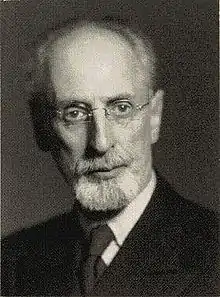Eli Heckscher
Eli Filip Heckscher (24 November 1879 – 23 December 1952) was a Swedish political economist and economic historian.
Eli Heckscher | |
|---|---|
 | |
| Born | 24 November 1879 |
| Died | 23 December 1952 (aged 73) Stockholm |
Biography
Heckscher was born in Stockholm, son of the Jewish Danish-born businessman Isidor Heckscher and his spouse Rosa Meyer, and completed his secondary education there in 1896. He conducted higher studies at Uppsala University (from 1897) and Gothenburg University College[1] (in 1898), completing his PhD in Uppsala in 1907. He was professor of Political economy and Statistics at the Stockholm School of Economics from 1909 until 1919, when he exchanged that chair for a research professorship in economic history, finally retiring as emeritus professor in 1945. In 1929 Heckscher founded the Institute for Economic and Business History Research as a key step in his effort to create the field of economic history in Sweden, and make it a policy-oriented science. He advanced his agenda by recruiting two other scholars, historian Bertil Boëthius (1885-1974) and economist Arthur Montgomery. Thereby the "Stockholm School" emerged and achieved a voice in government planning.[2]
By 1950 Heckscher had published 1148 books and articles. Well known were his study of Mercantilism, which was translated into several languages, and a monumental Economic history of Sweden in several volumes.[3] Heckscher is best known for a model explaining patterns in international trade (Heckscher-Ohlin model) that he developed with Bertil Ohlin at the Stockholm School of Economics.
Eli Heckscher's son was Gunnar Heckscher (1909-1987), a political scientist and the leader of what would later become the Swedish Moderate Party 1961–1965. His grandson is the Social Democratic politician Sten Heckscher.
References
- https://sok.riksarkivet.se/sbl/Presentation.aspx?id=12680&forceOrdinarySite=true#Arkivuppgifter
- Hasselberg, 2006
- Donald Cuthbert Coleman, "Eli Heckscher and the idea of mercantilism." Scandinavian Economic History Review 5.1 (1957): 3-25.
Sources
- Bertil Ohlin, "Heckscher, Eli Filip", Svenskt biografiskt lexikon, vol. 18, pp. 376–381.
Further reading
- Carlson, Benny, and Lars Jonung. "Knut Wicksell, Gustav Cassel, Eli Heckscher, Bertil Ohlin and Gunnar Myrdal on the role of the economist in public debate." Econ Journal Watch 3.3 (2006): 511+ online.
- Coleman, Donald Cuthbert, "Eli Heckscher and the idea of mercantilism." Scandinavian Economic History Review 5.1 (1957): 3-25 online.
- Hasselberg, Ylva. "Networks and Scientific Integrity: Eli Heckscher and the Construction of Economic History in Sweden, 1920–1950." Scandinavian Economic History Review 54.3 (2006): 273–290.
- Eli Heckscher, International Trade, and Economic History, Findlay, Ronald, Rolf G. H. Henriksson, Håkan Lindgren and Mats Lundahl, eds., The MIT Press, 2007.
- Heckscher, Eli F. (1922). Westergaard, Harald (ed.). The Continental System: An Economic Interpretation (1 ed.). Oxford: At the Clarendon Press. Retrieved 2 June 2016 – via Internet Archive.